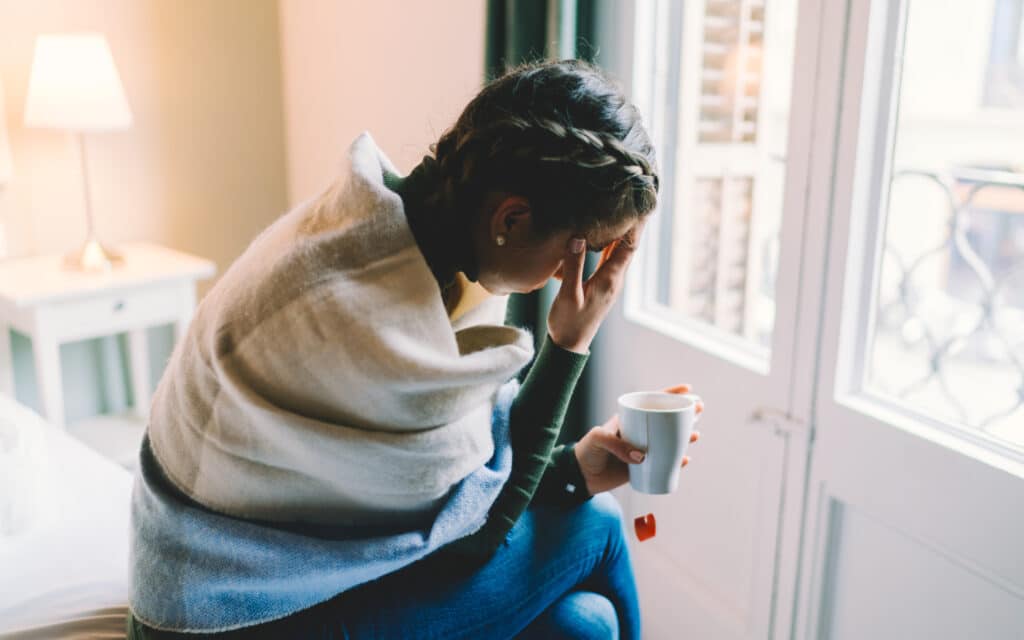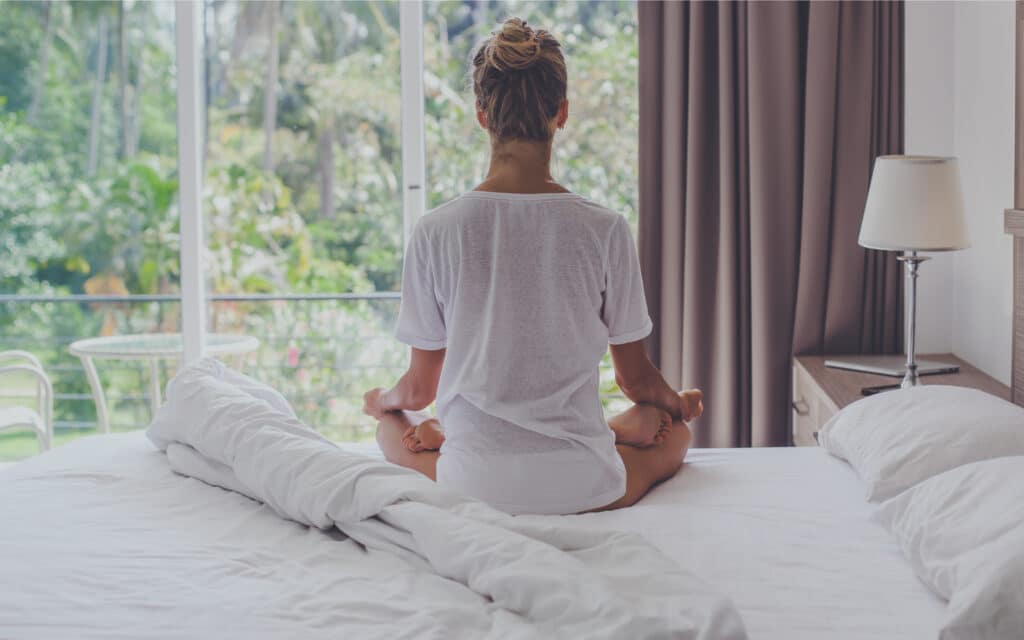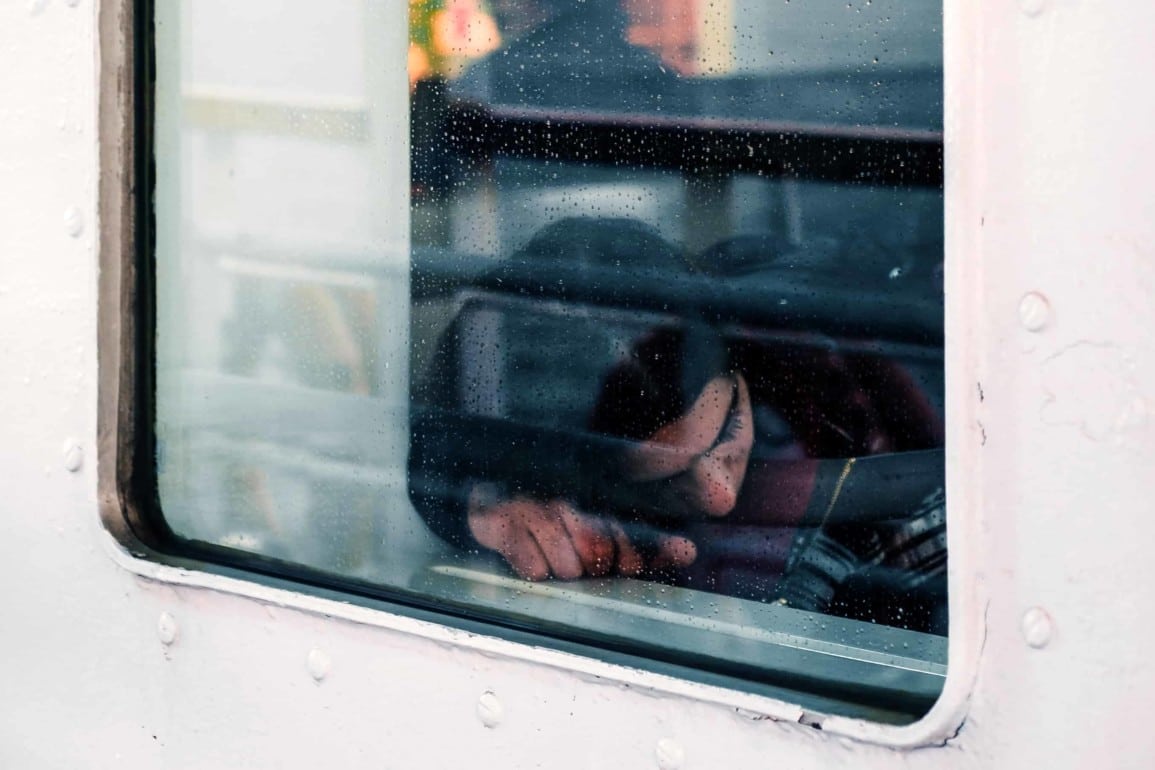What came first, your anxiety, or your sleep disorder?
It’s often difficult to tell.
The body and mind are intimately connected. When your mind isn’t in peak condition, your body suffers too, and vice versa. When you lose out on sleep, it’s not just your physical body that hurts, but your mind also.
At the same time, when you’re dealing with the side-effects of anxiety, from restlessness to heart palpitations, it becomes more difficult to fall asleep.
The more sleep debt you have the worse your anxiety will become. Additionally, if you can’t get control over your emotions, your risk of staying awake at night goes up. Just lying there struggling to control your heart rate.
According to Harvard Health, sleep problems affect over 50% of adults with anxiety disorders.
Sleep deprivation and anxiety go together like salt and pepper.
However, understanding the connection between these two things can help you to track down the right solution to your problems.

How anxiety worsens sleep deprivation
Let’s start by looking at how anxiety has an adverse impact on your sleep.
When you’re feeling anxious or stressed, your sympathetic nervous system stimulates something called the fight or flight response. This natural response is intended to prevent you from danger by getting you ready for action.
The sympathetic nervous system fills your body with cortisol (the stress hormone) and adrenaline.
You end up experiencing symptoms like:
• A rapid heart rate
• High blood pressure
• Sweating
• Muscle tightness
• Constipation or diarrhoea
• Headaches
Your cortisol and adrenaline levels are usually higher in the morning because that’s when you need to be alert and ready to start the day. If instead, your stress hormones are higher at night, then this can throw your entire sleep cycle off track. As cortisol is a large contributor in the sleep-wake cycle.
When you consider all the physical and hormonal symptoms that come with a dose of anxiety, it’s easy to see why the experience interferes with your sleep. In some cases, people even start to feel anxious about the act of going to sleep.
Poor sleep experiences or nightmares can lead to something called sleep anxiety when you develop a negative thought process about going to bed. When this happens, you may actively begin to avoid sleeping — even unintentionally.
How sleep deprivation causes anxiety
Just as anxiety can prevent you from getting a good night’s sleep with an influx of uncomfortable symptoms, the relationship works in reverse too.
Sleep deprivation and anxiety have a cyclic relationship. The less you sleep, the more anxious you feel. The more anxious you feel, the less you sleep.
The effects of sleep deprivation are proven to have a negative impact not just on our physical wellness, but our mental health too.
Here are some of the ways sleep deprivation causes anxiety:
Physical stress: Lack of proper rest puts significant stress on your body. You have to continue with your life as normal, but without the crucial repair and relaxation processes you go through when you sleep at night. This can aggravate inflammatory conditions like arthritis, and make it harder to deal with pain.
Emotional stress: Sleep is also critical for helping you to process the emotional events of the day at a subconscious level. The more sleep debt you have, the more the crucial parts of your brain responsible for emotional management suffer. This means even the smallest things that wouldn’t upset you on a typical day, will start to feel a lot more significant. Sleeplessness makes us hyper-sensitive.
Hormonal stress: Sleep deprivation can also harm the way that your hormones are managed and produced. When you sleep, your mind and body regulates hormones to support everything from digestion to mood, and your immune system. If your hormones are out of whack, you’ll struggle to feel like yourself, which can increase anxiety.
Digestive stress: Lack of sleep can also lead to significant digestive problems. Some studies indicate that the less we sleep, the more we crave unhealthy foods, which disrupts the digestive system and hence create more opportunities for stress.
The research on sleep deprivation and anxiety
While research into what causes sleep deprivation and anxiety is still ongoing, experts believe that the two issues are very closely connected.
One study presented at the annual meeting for Neuroscience in San Diego found that lack of sleep actually triggers the same brain mechanisms that make us sensitive to feelings of stress and anxiety.
For years, we’ve known that people with insomnia have a much higher risk of developing anxiety disorders. Additionally, as established above, we can see how anxiety can make it harder for us to fall asleep.
In the recent study from San Diego, the scientists asked healthy people to spend two nights in a sleep lab. During the first night, the participants were sleep-deprived, and the second, they weren’t. In the morning, the researchers found that the sleep-deprived individuals had significantly more activity in the emotional parts of their brain.
On average, the subjects experienced up to 30% higher anxiety on the day after poor sleep than on the day after having restful sleep. The researchers concluded that brain regions that help us regulate emotions are very sensitive to a loss of sleep.
Although the experiment showed that people returned back to typical levels of stress after resuming high-quality sleep, sleep-deprived people got more anxious and emotional with each sleepless evening.

Sleep deprivation and anxiety relief: Your options
So, is there anything that you can do to overcome anxiety and sleep deprivation?
Well, first of all, your doctor or sleep specialist will usually recommend getting to the bottom of what’s causing the initial problem.
Some anti-anxiety medications can reduce sleep disturbances, but it’s not sure whether these medications have a positive impact on sleep quality.
If you think that the underlying problem in your experience with anxiety and sleep deprivation is your anxiety, then your doctor might recommend using cognitive behavioural therapy.
CBT is a well-tolerated and low-risk treatment for sleep deprivation. By getting to the bottom of what’s causing your anxiety, experts can help you come up with strategies that will help you to feel more relaxed when falling asleep at night.
On the other hand, if you think that your anxiety disorder and sleep deprivation all started with poor sleep, then your doctor may take a different approach.
For instance, you might be given some basic sedating medications to help you start sleeping again.
Alternatively, you can try:
Using meditation and relaxation techniques when you go to bed
Taking a warm bath or meditating before you go to bed can help to eliminate sleep problems and reduce anxiety.
Exercise and nutrition
Getting regular exercise can help you to eliminate feelings of anxiety and feel more tired by the time you go to bed. At the same time, the right nutrition, without stimulants can assist with your sleep too.
Setting a consistent schedule
Following a regular schedule for when you wake up and go to sleep can assist with your sleep hygiene.
Calming surroundings
You can work on controlling stimuli that might keep you awake, like light or noise in your bedroom.
Avoiding naps before bedtime and cutting down your exposure to stimulants like coffee, sugar, and even alcohol can also make it easier to overcome problems with anxiety and sleep deprivation.
Overcoming anxiety disorder and sleep deprivation
Both anxiety disorders and sleep deprivation issues can cause serious problems with your wellness and quality of life. However, overcoming these issues isn’t always easy. The first step is getting to the bottom of what causes sleep deprivation and anxiety for you so that you can find the right solution to your problems.
Speaking to a doctor will help you to track down the root cause of your anxiety and sleep deprivation problems. Form there, you can check out some of the other resources at Siestio for tips on how to improve your sleep hygiene and enhance your sleeping routine.
Siestio. Sleep Matters.
Medical disclaimer
You must not rely on the information provided on our website as an alternative to medical advice from your doctor or other healthcare professionals. For more information read our full disclaimer here.







